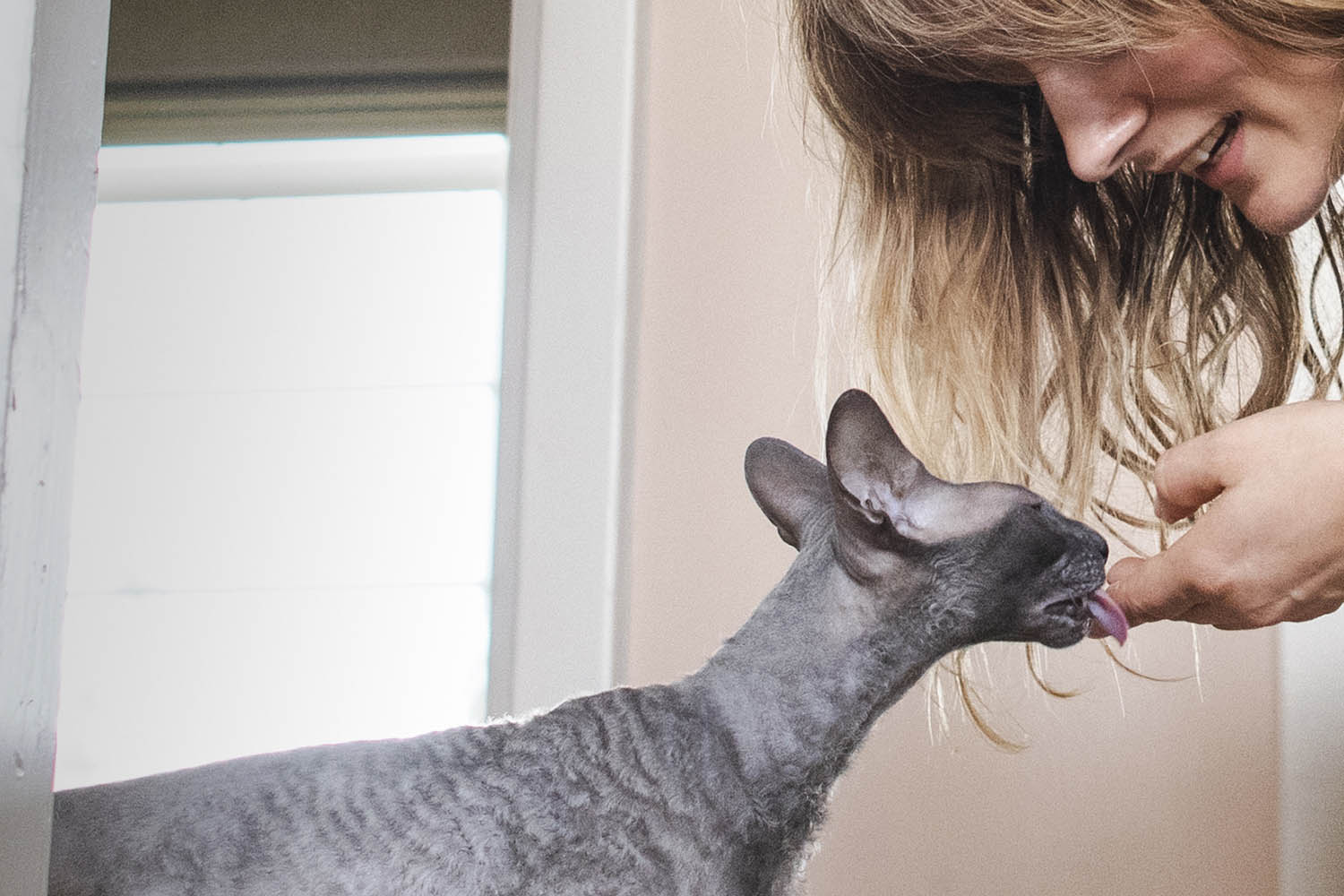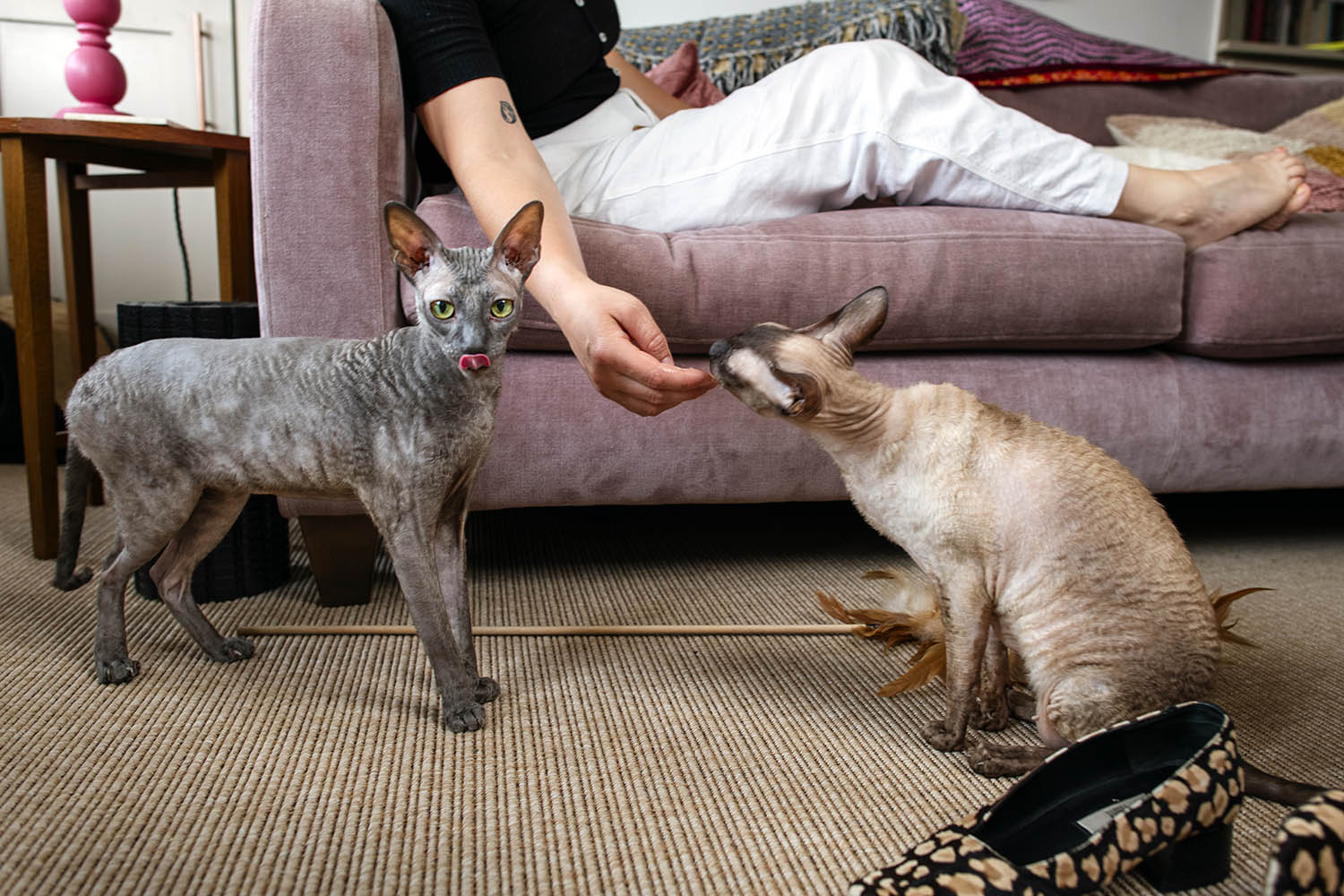All I ever wanted was a pet. Many pets, ideally. As a young child, I was permitted only hamsters and goldfish, and aged eight, around the turn of the millennium, I wept to my mother about the Sony Aibo, fearing that the robot dog would make real ones redundant. I planned out my future in terms of how many dogs I could plausibly squeeze into my lifetime, dividing my projected lifespan by that of a border collie.
Life never turns out how you imagined it as a child. The Sony Aibo was discontinued in 2006; there are more dogs in Britain than ever before; and I’ve wound up with two cats. I adopted Vlada in early 2023 in a pique of irritation with my then landlord, who’d left me without heating for 10 days in February. I decided that if my landlord wasn’t going to hold up their end of the deal, I wasn’t going to continue to deprive myself of a pet to please them.
After two years of living alone, it felt oppressive to return home to find everything always exactly as I’d left it. I wanted new domestic energy, to share my space and feel beholden to another being.
Unfortunately, the encyclopedic knowledge of responsible dog husbandry that I’d cultivated in childhood meant I could not in good conscience subject a dog (let alone a border collie) to my small flat and irregular schedule – so I compromised with a Cornish rex, an allegedly “dog-like” cat.
It took three months for Vlada to come out of her shell but, once she did, I was awed by her strength of character. She was bold but not brave, frequently disdainful, given to experimental fits of playfulness (she’d never learned, bless) but also self-consciousness. I felt sure I wasn’t anthropomorphising; she really did have a personality.
Caring for Vlada revealed a new side to me, too. Having always resisted committing myself to another person or even a place, I discovered I liked being answerable to her. I spent time thinking about how to make her happy, as an indoor cat entirely dependent on me and, in turn, that made me happy.
Vlada drew my attention outwards, beyond myself. When I’d been working for too long, she’d start knocking things off my desk, insisting I stop to entertain her. Sharing my bed with her small purring form, I was less inclined to spiralling thoughts. I finally kicked my self-destructive habit of staying up all night to meet a deadline because Vlada was so visibly perturbed by the disruption to our routine. I posted so many pictures of her on Instagram, strangers started asking after her (and one friend sent me a long text, advising me to stop).
After a year together, I got another Cornish rex – a kitten this time. Although I never left Vlada for long, I didn’t like to think of her alone, and believed another cat might at least provide interest. But my motivation was also selfish. Vlada had so manifestly improved my life and wellbeing, I thought a second cat could only increase that further.
Vlada did not agree. Despite my best efforts at a gradual introduction, she was furious at Myshka’s presence. For six weeks the atmosphere was palpable, blistering tension. Vlada started gagging after eating, clawing at her mouth as though she were choking. The vet said it was psychosomatic, brought on by stress.
The thought that I had made Vlada’s life worse for my own selfish ends made me feel sick, and challenged my views – and lifelong ambition – of pet ownership. I couldn’t have put it this way then, but I felt myself caught in an unexpected ethical dilemma: the more I’d come to care for an individual animal, the more I’d started to question the morality of “owning” them altogether.
Newsletters
Choose the newsletters you want to receive
View more
For information about how The Observer protects your data, read our Privacy Policy
Britain has always proudly identified as a nation of animal lovers. It reflects well on us, challenging our emotionally constipated image. Roughly half of UK adults own some type of pet. As social anthropologist Kate Fox wrote in 2004 in Watching the English, those bonds may “represent our only significant experience of open, unguarded, emotional involvement with another sentient being”.
In the 20 years since Fox’s book, however, the culture of pet ownership in Britain has transformed. Pedigree cats like mine are gaining in popularity, outstripping regular moggies for the first time in 2024. They are increasingly being kept indoors-only. The dog population, meanwhile, has ballooned to 10.6 million. Many have gone to first-time owners who are young, educated and affluent. And pet-related spending has skyrocketed, to nearly £12bn in 2024 – an increase of 182% since 2005, even amid a cost of living crisis.

Hunt with Myshka; the cat’s arrival caused ‘palpable, blistering tension’
Along with this, there has been a conspicuous shift towards treating pets as “fur babies” and even substitute children. It is no longer seen as absurd, infantile or American to “treat” our pets to cupcakes, clothing or cute accessories. (For the truly wealthy, Elle Decor reports, the “new luxury must-have” is a dedicated “dog room”.)
It seems telling that this “humanisation” of companion animals coincides with declining rates of partnership and parenthood. A 2024 survey found that Britons spent more on pets than on dating or childcare. At least versus dating, I’d agree: they offer a more reliable return on investment.
A recent study of more than 30,000 people across 20 countries suggested that people found their pets more comforting than their spouse. This may seem like a resounding endorsement of pets’ promotion in our lives and society – but are they any better off?
Since 2011, the annual PDSA Animal Wellbeing (PAW) report has painted a pretty paltry picture of owners’ ability to meet their pets’ needs, highlighting high rates of obesity, long periods of isolation and widespread behavioural issues. That’s setting aside big-picture issues like the persistent popularity of breeds like French bulldogs and Scottish Fold cats, plagued by health issues, and backyard breeding.
The “state of our pet nation”, successive PAW reports have summarised, is “stressed, lonely, overweight, bored, aggressive, misunderstood … but loved”.
In 2024, 19% of dogs were left alone for five or more hours in a day, up from 15% in 2022. For cats, the key cause of stress identified was cohabiting with another cat. Those, like mine, kept exclusively indoors may have no reprieve.
My intentions were good, but I realised as soon as I brought Myshka home that it was to Vlada’s detriment. A year-and-a-half later, they mostly get on, spending hours curled up like interlocking croissants – but I suspect Vlad would have preferred to stay a solo cat. The misstep rattled me, showing just how easy it can be to let pet welfare slide. We might shower our cats with toys, but do we make time to play with them? We think we’re doing our dogs a favour by taking them to the pub, or on holiday, instead of leaving them at home – but is that just a different kind of stress?
Every time I leave the house, I see dogs being jerked around by the lead, not allowed to sniff or explore; stressed by crowds, or bored of waiting. I thought I’d been acting responsibly by getting a more manageable pet than the one I really wanted – but had I considered how to give a cat a good life? The more I thought about pet ownership, the more uncomfortable I felt about the very concept. Pets benefit us. But do we benefit pets?
When, in 2016, Jessica Pierce published Run, Spot, Run: The Ethics of Keeping Pets, she thought it would be the end of her career. “I thought, ‘I’m writing something so distasteful – nobody’s going to read it, and I’m never going to have anything published again’,” she tells me by Zoom from her Colorado home. Her dog Bella is just off-camera at her feet.
In fact Pierce’s book – which argues that our relationship to companion animals is lopsided and, at best, a “relatively benign form of exploitation” – has drawn steady attention, she says. “I think it’s because this undercurrent, even though it’s really hard to swallow, is there for a lot of people.”
Pierce is a bioethicist at the University of Colorado and a writer focused on human-animal relationships – though rarely the fuzzy, feelgood side. Having first become interested in palliative care (“the bread and butter of bioethics”) for companion animals, Pierce is now one of a handful of researchers questioning pet ownership, and whether the benefits (for us) can be said to justify the costs (overwhelmingly, to them).
Although “a lot of dogs and cats do live good lives”, the contract is entered into more casually now than in the past, she suggests. “Thirty years ago, I think people would say ‘Dogs need space to roam around’.”
I see dogs being jerked by the lead, stressed by crowds or bored of waiting
I see dogs being jerked by the lead, stressed by crowds or bored of waiting
Today, they mainly live in urban areas, with limited access to green space or time to roam, with a widely reported increase in behavioural issues and aggression.
“I think that’s a symptom of their distress, that they’re acting out – and that we’re super-intolerant of normal dog behaviours,” Pierce says. Her latest book, Who’s a Good Dog?, in fact teaches “how to be a better human” – “because it really does come down to us”.
She feels even more conflicted about cats, as they are less domesticated than dogs and often easier to underestimate. “People assume that they are perfectly happy curling up in a sunbeam on the floor.” (I nod soberly, as if I’d never make that mistake.)
Over recent decades, Pierce says, pet ownership has undergone a process of “intensification” akin to the shift from traditional pig farming to factory farming. Studies have shown that farmers’ compassion for pigs declined with that transition, which doesn’t surprise Pierce. “I think that the same thing has happened in pet-keeping. As pets, animals have become so commodified, there’s been this inverse relationship with attention to their needs.”
The irony is, she says, pointing to the staggering sums spent on coats, cupcakes and spa days, “I think people think they’re treating their animals better than ever before”.
It’s not surprising when we’re so encouraged to focus on how pets benefit us. Much of the research and reporting on their effect on wellbeing reads “like pets are a pharmaceutical, like Prozac or something”, Pierce observes dryly. But the relationship isn’t as straightforwardly advantageous as we’re led to believe.
A 2021 study by Tufts University in Massachusetts found that, although owning a dog was associated with higher levels of activity, after controlling for demographic and socioeconomic differences, pet owners were not significantly physically or psychologically healthier than non-pet owners. Pet ownership was in fact associated with elevated odds of depression; the authors suggested it could in some cases reflect the burden of their care.
For all the stories and studies about pets’ stress-relieving powers, we never hear about the stress they feel – or even cause. Pierce likens the rosy reported “pet effect” to personal stories of parenthood, glossing over the frequently difficult reality. “It’s good clickbait, and it makes people feel good – but it’s not good for animals.”
Yet, Pierce concurs – it’s hard to even imagine a “post-pet future”, if only because it’s big business. An estimated 1-2 million puppies are bought and sold each year in the UK, a market valued at up to £300m. If that wasn’t mind-boggling enough, global appetite for pet cloning is growing rapidly, projected to reach $6.7bn in 2028.
Meanwhile, an estimated 250,000 animals end up in UK rescue centres each year. The number of pets needing homes leads people to argue that even imperfect care is better than none; but Pierce says that lets us off the hook too easily.
We are, after all, continuing to breed animals in industrial quantities, some with features – like short noses and folded ears – that profoundly compromise their health and wellbeing. We flaunt our pets online but neglect them in reality, splurge on accessories but skimp on essentials. Sometimes the tensions we’re willing to overlook can make us queasy. Pierce recalls with disgust and wonder, seeing an Instagram-famous “petfluencer” take her pig to a burger joint.
“I’m not saying we shouldn’t live with companion animals,” she says, “but I am saying we should do it very differently.”
Thinking about the subject leaves me feeling drained and a bit hopeless – the same way I feel whenever I reflect on my consumption of meat. There is no easy, obvious, ethical way forward with pet ownership, industrial farming or any other aspect of our modern-day engagement with animals. But, Jay Griffiths argues, it is possible to strike a balance we can live with.
There is no easy way forward with modern engagement with animals
There is no easy way forward with modern engagement with animals
Even after Pierce’s warning of the “pet effect paradox”, I admit it’s a relief to indulge the feelgood factor with Griffiths’s new book, How Animals Heal Us. It teems with accounts of pets enlarging, improving and saving human lives; I cling to it like a liferaft. There are dogs that sniff out cancer, cats with healing purrs, a pot-bellied pig that flagged down a car when her owner was incapacitated by chest pains. “Anybody who spends time with animals feels these things, but these are more than intuitions – they’re really well-rooted,” says Griffiths from her home in Wales.
We’re continually gaining greater understanding of animals’ inner worlds and abilities. Historically, conservation, research and the public have favoured “charismatic” species (such as elephants and pandas) and intelligent ones (dogs, pigs, octopuses). But in recent decades we’ve gained new insights into those dismissed as minor players, such as insects and fish. “For hundreds of years, we’ve been trying to say that we humans are exceptional, because we have language and they don’t – but it’s not true,” Griffiths says. The same applies to other measures of sophistication such as tool use, humour and spirituality.
That could bolster the case against pets, suggesting they’re even more bored or constrained than we realise. But Griffiths points to humans’ long history of living with animals. The domestication of dogs began 11,000 years ago, towards the end of the last ice age (though cats were much more recent). Indigenous cultures around the world also have a long tradition of pet-keeping. “It is clearly something that we humans have always wanted, needed, sought,” Griffiths says.
The company of animals also makes us better, she argues – and not just by lowering stress hormones and blood pressure. “Pets are often really good at helping humans communicate with other humans … Families who get a pet tend to argue less and play more.”
Griffiths still has qualms about the modern approach to keeping pets: she’s against having birds as pets, and bringing outdoor cats indoors, and leaving dogs alone for long periods, and dressing them up. “I think there is something amiss when people are deeply – and rightly – attached to their pets, and that’s where the line stops … the [rest of] the animal world is sort of mistreatable.” But she does not believe pet ownership is necessarily unethical, or unjustifiable. “For me, on balance, what pet-keeping gives a whole culture is good for us.”
Pierce hopes to see people approach pet ownership with the same emotional maturity, responsibility and commitment as they would ideally approach parenthood. “The primary thing that I would wish for is for more people to feel more uncomfortable,” she says. “I think that would impel us to do better for the animals we already live with, and maybe make us think twice about whether we should really continue with it.”
Pierce has tentatively resolved that her current pets – Bella the 14-year-old collie-mix and two cats inherited from her late mother-in-law – will be her last. “I’m committed to them for the rest of their lives, but I feel like I need to – want to – opt out of it,” she says. “I’m just tired of feeling like I’m doing the wrong thing.”
I’m not sure if I can give up on my lifelong dream of having a dog, but my experience of cats has made it seem an even more weighty responsibility. On balance, Vlada and Myshka have been good for me. Even the angst I’ve felt about their wellbeing has been productive, prompting me to research feline behaviour and be proactive about meeting their needs. I’ve started playing more with Myshka, and ensuring that Vlada has daily time to herself and alone with me. Just the thought I’m giving to them both can be seen as a positive, Pierce says. “The better pet owner you are, the more conflicted you’re going to be.”
How Animals Heal Us by Jay Griffiths is published in hardback by Hamish Hamilton (£20). Who’s a Good Dog? And How to Be a Better Human by Jessica Pierce is published by the University of Chicago Press (£20)
Photographs by Ali Smith/The Observer

